| Srl | Item |
| 1 |
ID:
057209


|
|
|
|
|
| Publication |
Jun-Sep 2003.
|
|
|
|
|
|
|
|
|
|
|
|
|
|
|
|
| 2 |
ID:
065689


|
|
|
| 3 |
ID:
131406


|
|
|
|
|
| Publication |
2014.
|
| Summary/Abstract |
This article is a microhistory of the siege and capture of the fortified city of Khujand by Russian forces under Major-General D.I. Romanovskii in May 1866. It explores what this episode can tell us about the nature of siege warfare and frontal assaults in the course of the Central Asian campaigns of the Russian army, but more particularly the nature of Khujandi resistance and the motivations for it. It argues that these are to be found, above all, in a strong sense of local patriotism connected with the city itself, rather than in any form of proto-nationalism, loyalty to the Khan of Khoqand or the Emir of Bukhara, or Islam.
|
|
|
|
|
|
|
|
|
|
|
|
|
|
|
|
| 4 |
ID:
140379
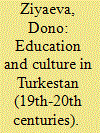

|
|
|
| 5 |
ID:
127341


|
|
|
| 6 |
ID:
127440
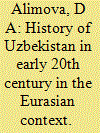

|
|
|
| 7 |
ID:
131412
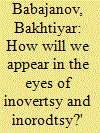

|
|
|
|
|
| Publication |
2014.
|
| Summary/Abstract |
This article offers a close reading of several unpublished manuscripts by the Russian Orientalist, administrator and missionary ideologue Nikolai Petrovich Ostroumov, who spent most of his career in the Turkestan governor-generalship. Ostroumov's violent Islamophobia and close relationship with the colonial administration support to some extent the thesis of Edward Said and other postcolonial theorists that European views of the 'Orient' were an epistemological construction of negative attributes that reflected European self-perceptions, and that academic Orientalism was often the handmaiden of colonial power and expansion. However, much of Ostroumov's writing was so abstract and divorced from the social and political realities of Turkestani society that it was of little practical use, something compounded by his view of Orthodox Christianity and Islam as polar opposites. Ostroumov's private writings reveal a deep anxiety regarding the durability of Russian conquest and rule in Central Asia, and paranoia about the decline and destruction of the Christian faith and European civilization.
|
|
|
|
|
|
|
|
|
|
|
|
|
|
|
|
| 8 |
ID:
155516


|
|
|
| 9 |
ID:
128488
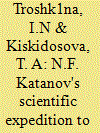

|
|
|
|
|
| Publication |
2013.
|
| Summary/Abstract |
Actual position of the investigation of this territory was expressed in academician V. V. Radloff's words: "Importance of the investigation of the Turkic tribes' remains in the far east is unquestionable because these
countries have never been visited by experts of the Turkic languages. And we have only odd bits of information collected by outside observers who were not specially prepared for aimobjective".' In 1891 N. F. Katanov was sent by Imperial Saint-Petersburg Academy of Science and Imperial Russian Geographic Society to Eastern Turkestan as the most prepared specialist in the Turkic languages. The investigation of the territory was held in the framework of an investigation project of the Turkic tribes in Eastern Siberia, Mongolia and Northern China to analyse the Turkic tribes' language and household activities. At that time Eastern Turkestan or Uigurstan was a part of China as its northern region - Xinjiang which included Kashgaria (southern part) and Dzungaria (northern part). Population of this region comprised of different Turkic groups: the Turcomen- Uygurs and Kazakhs-Kirghiz worshiping Islam, the Mongolians-Oirats and Chinese Turcomen worshiping Buddhism, etc.
|
|
|
|
|
|
|
|
|
|
|
|
|
|
|
|
| 10 |
ID:
128490
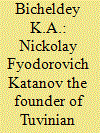

|
|
|
|
|
| Publication |
2013.
|
| Summary/Abstract |
Tuvinian studies is a comparatively new branch in Russian science and represents a set of scientific actions of collective and individual character. In a broader meaning it is a knowledge system about Tuva and the
Tuvinians. Its formation, further development and expansion are connected with the activity of Imperial Russian Geographic Society (IRGS) in the investigation and study of Central Asia in the second half of nineteenth and early twentieth century. The period from 1842 till 1945 can be conditionally called as "the
golden age" of Tuvinian studies. Undoubtedly it was preceded by a range of Tuvinian studies / researches in sixteenth to nineteenth centuries. In this period of history Russian empire strengthened the spread of its
geopolitical interests in Central Asia. Independent explorers and entire expeditions from Russia went to Mongolia, China and Tibet for different purposes including scientific ones. Frequently their pathway ran through the Uryankhai region (one of the former names of Tuva at that time), so explorers and researchers included Uryankhai (Tuva) in the plans of their investigations. Eventually general interest of the Russian empire and its scientific society in Central Asia led to the execution also of special investigations about Tuva.
|
|
|
|
|
|
|
|
|
|
|
|
|
|
|
|
| 11 |
ID:
079502
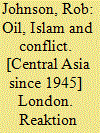

|
|
|
|
|
| Publication |
London, Reaktion books, 2007.
|
| Description |
272p.pbk
|
| Standard Number |
9781861893390
|
|
|
|
|
|
|
|
|
|
|
|
Copies: C:1/I:0,R:0,Q:0
Circulation
| Accession# | Call# | Current Location | Status | Policy | Location |
| 052916 | 958.042/JOH 052916 | Main | On Shelf | General | |
|
|
|
|
| 12 |
ID:
120275
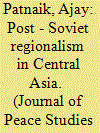

|
|
|
| 13 |
ID:
140381


|
|
|
| 14 |
ID:
131411
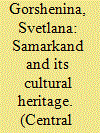

|
|
|
|
|
| Publication |
2014.
|
| Summary/Abstract |
This article is concerned with the creation, by the Russian colonial administration, Russian researchers and photographers/artists, of a corpus of 'historical monuments' of Samarkand in the first decades after the conquest of the city. It uses travelogues, administrative reports, memoirs, the periodical press and artistic productions to determine the mechanism of selection of representative monuments, defined as the 'cultural heritage' of Russian Turkestan and, indirectly, of the Russian Empire. The internal logic of 'patrimonialization', initiated from above and ideologically engaged, becomes more obvious when it is juxtaposed against native understandings of the significance of monuments, European practices, and the political projects of the Russian Empire.
|
|
|
|
|
|
|
|
|
|
|
|
|
|
|
|
| 15 |
ID:
107543


|
|
|
|
|
| Publication |
2011.
|
| Summary/Abstract |
During the Russian Civil War, special vehicles visited the vast country's diverse regions as emissaries of central authority. The so-called 'agitational' vehicles carried out the functions of propaganda and agitation, 'instruction' (governance) and surveillance in the pursuit of two overarching, and sometimes contradictory, goals: state building and the radical transformation of society. The Krasnyi Vostok (Red East) expedition to Turkestan in 1920 was exceptional in the degree to which the train interfered in local governance regimes. It sought to win over a Muslim majority that had been terrorized by Soviets formed by Russian colonizers, which had not represented the masses but rather perpetuated racist domination. Ironically, having surveyed the vast gulf between the Bolsheviks' revolutionary gaze and the complex and diverse world in which they found themselves, the Krasnyi Vostok activists concluded that 'socialist colonization' was the essential task in Turkestan.
|
|
|
|
|
|
|
|
|
|
|
|
|
|
|
|
| 16 |
ID:
190952


|
|
|
|
|
| Summary/Abstract |
A variety of wormwood, Artemisia cina, once grew abundantly in the Syr-Darya province of Russian Turkestan. Santonin, a drug derived from it, was in high demand. Flowers harvested by Kazakhs were handed over to intermediaries to be processed in Europe, but from the 1880s entrepreneurs from different parts of the Russian empire established their own chemical plants in Chimkent and Tashkent. They pressured the Russian imperial government to restrict the rights of the Kazakhs on land where Artemisia cina grew, and grant them the exclusive right to exploit this resource. These entrepreneurs used conservationist arguments and advocated a ‘cultured’ approach to the management of natural resources located on supposedly ‘State land’. These attempts collided with the usage rights of the Kazakhs, as defined by Turkestan’s governing Statute. By shifting the argument to the political, rather than legal, level, the industrialists eventually gained a monopoly to the exclusion of local entrepreneurs and even assumed State-like functions. This article reconstructs this controversy and allows a glimpse into the evolving claims to natural resources in the ‘periphery’ by both Tsarist colonial power and the Kazakhs themselves. The article also explores the features of autochthonous and Russian entrepreneurship and situates Turkestan in a web of trade connections to the global pharmaceutical industry.
|
|
|
|
|
|
|
|
|
|
|
|
|
|
|
|